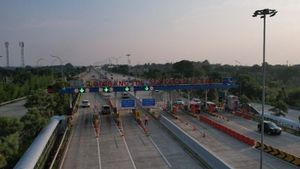YOGYAKARTA - The relatively small salary of Indonesian workers has become a topic of long discussions in the economic and labor sector. This problem is influenced by various aspects, ranging from the macroeconomic situation to labor regulations, which make it difficult for workers in Indonesia to get a decent wage. This post will regulate several main reasons why Indonesian workers' salaries are small, and factors that influence the level of wages in this country.
One of the main reasons for the salaries of small Indonesian workers is the relatively low level of worker productivity compared to other countries. Productivity is often measured through the output generated by workers at a certain time. According to data, the productivity of Indonesian workers is still lagging behind when compared to other countries in Southeast Asia such as Singapore, Malaysia, and Thailand.
The trigger for this low productivity can vary, including the quality of education and training that is still not optimal, limited access to advanced technology, and inadequate infrastructure. Low productivity means that workers' contribution to companies is relatively small, so companies tend to provide lower income.
The number of workforces in Indonesia is very large, with the population continuing to increase every year. Unfortunately, the existing jobs are not proportional to the amount of workforce. This situation causes an oversupply of labor, which in conclusion reduces the wage rate. Because the large number of workers who are willing to work at low pay, the company does not have pressure to increase wages.
Not only that, the unemployment rate which is still quite large also contributes to the low income of workers. Many people prefer to accept jobs with a small income rather than not work at all. This results in a situation where the company can take advantage of the scarcity of employment and set a low minimum wage.
Although Indonesia has a minimum wage policy regulated through the government, this regulation is often considered insufficient to ensure the welfare of workers. The regional minimum wage (UMR) set in various provinces is often insufficient to cover the growing living budget, especially in big cities such as Jakarta and Surabaya.
Companies, especially in informal areas and small industries, often only pay their workers the amount of UMR or even below. Meanwhile, in the formal sector, many companies comply with this provision, but the wages given are always not comparable to the increase in living expenses. One of the reasons for the salary of small Indonesian workers is the existence of a gap between the minimum wage policy and the real needs of the workers.
The structure of the Indonesian economy, which is still dominated by labor-intensive sectors, such as agriculture, manufacturing, and services, is also one of the reasons why Indonesian workers' salaries are small. These sectors generally do not require workers with high skills, so the income offered is also relatively low. The labor-intensive industry tends to employ many workers with minimal pay pay, because the company's main focus is to reduce production costs to remain competitive.
Meanwhile, developed countries have shifted to high-tech and knowledge-based sectors, Indonesia is still lagging behind in terms of innovation and economic transformation. As a result, most Indonesian workers are in sectors with low added value, which contributes to the low wages they receive.
SEE ALSO:
In many developed countries, trade unions have an important position in fighting for workers' rights, including in salary negotiations. However, in Indonesia, the strength of the union is still relatively weak. Many workers who are not yet incorporated in the union, as well as existing unions often do not have a significant influence in determining wage policies.
The lack of strength of this union makes negotiations between workers and employers unbalanced. Workers often do not have strong bargaining power to demand an increase in salaries, especially in the face of large companies that have greater resources and influence.
The reason for the salaries of other small Indonesian workers is the result of globalization and international competition. Many industries in Indonesia are export-oriented and operate in the global market. To always be competitive, they are obliged to reduce their production budget, including the labor budget. This creates many companies choose to provide low salaries to their workers so that they can always compete in the international market.
As an example, textile companies and export-oriented garment often pay their workers with a minimum wage to offset lower production costs in competing countries such as Vietnam and Bangladesh.
As an additional reference related to salary, this time there are 10 Countries with the Lowest Minimum Wage. Where are they? Click the link adrift, yes!
So after knowing the reason for the salary of small Indonesian workers, see other interesting news on VOI.ID, it's time to revolutionize news!
The English, Chinese, Japanese, Arabic, and French versions are automatically generated by the AI. So there may still be inaccuracies in translating, please always see Indonesian as our main language. (system supported by DigitalSiber.id)

















